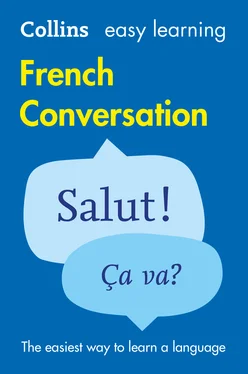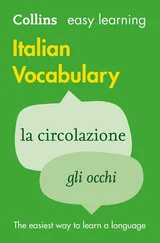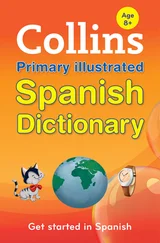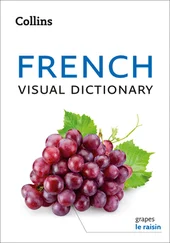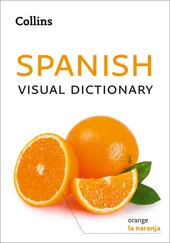1 ...6 7 8 10 11 12 ...18
| Il faut quej’achète mon billet demain. |
I have tobuy my ticket tomorrow. |
| Il fautd’abord queje prenne le Train Express Régional jusqu’à Niort. |
I have totake the local train to Niort first. |
| Il faut qu’on y soit avant 8 heures. |
We have tobe there by 8 o’clock. |
| Il faudrait queje fasse le plein. |
I ought tofill up the tank. |
| Il faudrait queje confirme mon vol. |
I ought toconfirm my flight. |
| Il faudrait qu’on soit à la gare à sept heures. |
We ought tobe at the station at seven. |
| Il faudrait qu’on prenne plus de carburant. |
We ought toget some more petrol. |
Another way of saying what you have to do is to use je dois( I must ) followed by the infinitive.
| Je doisaller chercher la voiture avant trois heures. |
I mustcollect the car before three. |
| Je doisprendre le bus à 5h30 demain matin. |
I mustcatch the bus at 5.30 tomorrow morning. |
| Vous devezprésenter votre permis de conduire. |
You mustshow your driving licence. |
| Vous devezimprimer votre billet électronique. |
You mustprint out your e-ticket. |
SAYING WHAT YOU WANT TO DO
When you are using some kind of transport in France, you may well need to say what you would like to do in French. You can use je voudrais( I’d like ) with the infinitive. This comes from the verb vouloir.For more information on vouloir,see here.
| Je voudraislouer un vélo. |
I’d like tohire a bike. |
| Je voudraisprendre le train. |
I’d like totake the train. |
| Mon ami voudraitsignaler la perte de ses bagages. |
My friend would like toreport his luggage missing. |
The most direct way of saying what you want to do is using je veux( I want ) or je souhaite( I wish ) with the infinitive. veuxis from the verb vouloirand souhaiteis from the verb souhaiter.For more information on vouloirand -erverbs like souhaiter,see hereand here.
| Je veuxaller à Marseille. |
I want togo to Marseilles. |
| Je veuxdescendre à Nancy. |
I want toget off at Nancy. |
| On veutpartir demain matin. |
We want toleave tomorrow morning. |
| Je souhaiteéchanger mon billet. |
I want tochange my ticket. |
| Je ne souhaite pasvoyager en première classe. |
I don’t want totravel first class. |
If you want to say that you feel like doing something, say j’ai envie de( I feel like ). This is slightly stronger than j’ai bien envie de( I quite fancy ). aicomes from the verb avoir.For more information on avoir,see here.
| J’ai envie depasser par Annecy. |
I feel likegoing via Annecy. |
| J’ai envie defaire le voyage en plusieurs fois. |
I feel likebreaking the journey. |
| On n’a pas envie depasser six heures dans le train. |
We don’t feel likespending six hours on the train. |
| J’ai bien envie d’aller à Port-Vendres. |
I quite fancygoing to Port-Vendres. |
You may wish to make a suggestion to your colleagues or friends in French. One way of doing this is to use on pourrait( we could ). This comes from the verb pouvoir.For more information on pouvoir,see here.
| On pourraity aller demain. |
We couldgo there tomorrow. |
| On pourraitfaire étape à Agen. |
We couldbreak our journey at Agen. |
| On peuty aller à pied, si tu préfères. |
We canwalk, if you prefer. |
BON À SAVOIR!
If you want to ask someone what they think of a particular suggestion, use Qu’est-ce que tu en dis?or Qu’est-ce que vous en dites?( What do you say? ).
| Je peuxte déposer, si tu veux. |
I cangive you a lift, if you like. |
| Je peuxte retrouver à l’aéroport, si tu veux. |
I canmeet you at the airport, if you like. |
| On peutdemander au contrôleur, si vous voulez. |
We canask the ticket inspector, if you like. |
If you want to ask someone if they would like to do something, use Tu veux…?,or Tu voudrais…?( Would you like…? ) if you know the person well or Vous voulez…?if you’re talking to several people. These all come from the verb vouloir.For more information on vouloir,see here.
| Tu veuxaller te baigner? |
Would you like togo for a swim? |
| Tu veuxte reposer un peu? |
Would you like tohave a little rest? |
| Est-ce que tu veuxprendre le volant? |
Would you like todrive? |
| Vous voulezy aller à pied? |
Would you like towalk there? |
| Est-ce que vous voulez qu’on s’arrête ici? |
Would you like tostop here? |
Another way of making suggestions in French is to ask Pourquoi ne pas…?( Why don’t…? ), which is often shortened to Pourquoi pas…?in spoken French.
| Pourquoi ne paslouer une voiture? |
Why don’t wehire a car? |
| Pourquoi ne pasprendre le métro? |
Why don’t wetake the underground? |
| Pourquoi pasdemander au chauffeur? |
Why don’t weask the driver? |
Читать дальше
